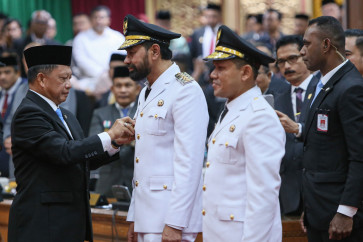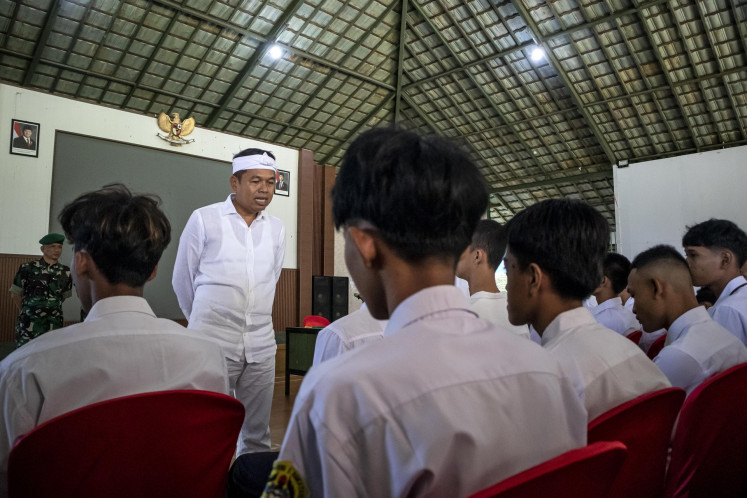Ramadhan Festivities: Lebaran in Indonesia
JP/Zul TrionggonoEvery year, nearly two billion Muslims around the globe celebrate Ramadhan
Change text size
Gift Premium Articles
to Anyone

JP/Zul Trionggono
Every year, nearly two billion Muslims around the globe celebrate Ramadhan. It falls on the ninth month of the Islamic calendar and is observed as a month of fasting by Muslims worldwide to commemorate the first revelation of the Quran to the Prophet Muhammad.
This annual observance, lasting an entire month, is one of the Five Pillars of Islam, and ends with the religious holiday of Idul Fitri, which is sometimes spelled Eid Al Fitr, and is often referred to as Lebaran in Indonesia.
Around the world, Idul Fitri is typically celebrated with greetings such as “Eid Mubarak,” which means “blessed Eid.” Idul Fitri always begins with an Eid prayer, usually done at a mosque or an open field.
Following the prayer, depending on the culture, unique Idul Fitri traditions are celebrated the world over.
In Egypt, for instance, there are often special Eid programs on TV and at movie theaters. On the Indian subcontinent, women often spend the Eid shopping for delicacies and buying clothes and accessories. In non-Muslim-majority countries like the United States, there are typically Eid bazaars.
How Indonesians celebrate Idul Fitri: Mudik
Indonesia has its own unique ways of celebrating Idul Fitri. Indonesian Muslims are known for mudik.
Mudik is notable for being one of the world’s largest annual acts of temporary human migration. Through mudik, tens of millions of Muslims migrate from big cities and return to their hometowns to celebrate Idul Fitri with their families and ask for forgiveness from their elders.
This year, a total of 532 aircraft have been prepared to fly people to their hometowns. These aircraft will operate 10 days before and 15 days after Idul Fitri. The Transportation Ministry estimates a 9.2 percent increase in air passengers during this year’s exodus to 5.5 million from 4.9 million recorded last year. There are also thousands of buses, hundreds of ships and millions of private cars to move people from towns and cities to villages.
The numbers in other areas have increased each year. According to the Central Java provincial administration, the number of homebound travelers entering the province during this year’s Idul Fitri festivities is expected to increase by around 30 percent, from 6.28 million last year to 8.14 million this year.
Food, festivities, family
In addition to the mudik exodus, Indonesia distinguishes its Idul Fitri celebrations in a number of other ways.
Indonesians have their own unique phrases specific to the religious holiday. When Muslims in Indonesia ask each other for forgiveness for wrongdoings committed the previous year, they do so by saying “mohon maaf lahir dan batin.” This act is referred to as sungkem. Through sungkem, a young person kneels and bows their head to elders’ knees and asks for forgiveness. Another commonly used phrase, “Minal Aidin Wal Faidzin,” is typically exchanged when meeting friends and family.
Once morning Eid mass prayers are over, people usually visit their parents and relatives, during which they ask for forgiveness, wear new clothes, exchange gifts and visit recreational parks to celebrate a successful completion of Ramadhan. Oftentimes, friends or office colleagues get together for Halal Bihalal gatherings to share meals and ask for forgiveness.
Adults also often give money to younger children. Some people send Lebaran greeting cards characterized by geometric designs to Muslim friends. Idul Fitri is also an occasion for people to dress up in the most fashionable Muslim clothing they can find. Another common ritual involves visiting the graves of loved ones, during which they recite prayers for the deceased.
During the celebrations, a number of traditional dishes can be found in Indonesian households, including ketupat (rice cakes). This is often served alongside opor ayam (chicken braised in coconut milk). Desserts include cakes and dodol (sugar-palm sweet).
Places to go during Idul Fitri
Idul Fitri is a festive and hectic time of the year throughout the country. Those in the capital can visit a variety of shopping centers and hotels for special offers and exciting activities.
At grandkemang Jakarta and Hotel Borobudur Jakarta, guests can purchase special Idul Fitri gift baskets. Cafe One at the Park Lane Jakarta will have its own Idul Fitri dinner and The Dharmawangsa Jakarta will have a special Lebaran brunch.
Shopping centers such as Senayan City and Puri Indah Mall have Ramadhan themed sales. The ongoing Jakarta Great Sale 2017 is set to continue until July 12, with 81 malls, 40 traditional markets and 12 hotels participating.
Those outside the capital can also look forward to special offers during Idul Fitri. In Bali, for instance, places such as The Mulia Bali, the Maya Ubud, the Hilton Bali, the Sheraton Bali and the Conrad Bali have their own Idul Fitri special feasts and stay packages.









